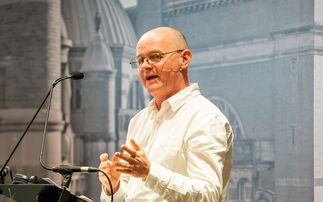
Chrissy Galerakis is head of social value strategy at Equans UK & Ireland | Credit: Equans
Industry Voice: Chrissy Galerakis, head of social value strategy for Equans UK & Ireland, explains why delivering social value should be central to net zero project planning
Most major organisations will wax lyrical about their social value commitments and corporate social responsibility and not necessarily realise it's true value or true potential.
Too often viewed a 'bolt on' or 'nice to have' - with companies doing some ad-hoc volunteering in food banks, donating to community projects, or dropping into local schools - the power of social value is a vastly underestimated channel to address broader societal challenges - namely decarbonisation.
Let me be clear - all those things are hugely meaningful initiatives independently; but they are not often delivered in a coordinated way or designed as part of comprehensive programme linked to projects and broader initiatives. And this is where there is a disconnect.
In the UK, as of 2012, it is a legal requirement for all public sector organisations and their suppliers to look beyond the financial cost of a contract and consider how the services they commission and procure might improve the economic, social, and environmental well-being of an area.
From inception to present day, firms have undoubtedly improved their social value efforts - viewing them less of an add on and more of a great way of engaging communities. What is taking longer to establish, is strategic thinking behind social value and the mutually beneficial ways it can support projects and lend itself to addressing broader societal challenges such as fighting climate change.
Take the example of skills and labour. Some of the biggest barriers faced by the public and private sector alike on the road to net zero are the lack of skills in the industry and the lack of new skills required to deliver the decarbonisation and sustainability agenda. The 2011 census highlighted that one in five UK-born construction workers were over 55, and now that these workers have reached retirement age, it is clear they have not been replaced. It is expected that over a quarter of a million extra construction workers may be needed by 2026, according to the Construction Skills Network. On top of this, the Construction Industry Training Board estimated in 2021 that 350,000 brand new 'green' roles will need to be created within the construction industry, and radical changes to skills development and deployment are required at speed and scale.
Companies need to leverage information like this and stop just thinking about what is the minimum we can do to meet contractual social value requirements, but how we can leverage our investments to be mutually beneficial. We are in the midst of a skills crisis and without adequate expertise to deliver retrofit we will ultimately fail in our endeavours to decarbonise. It is more than in our interests to promote roles within this field, offer training and apprenticeship opportunities and encourage new and existing generations to support us in meeting our targets. Its not just add on activities, but looking at how we deliver our work, and who we do this with.
Additional factors need to be considered too across every sector. Organisations need to consider how they operate and recruit, by removing barriers for marginalised groups. They need to engage through outreach and in partnership with other organisations, with young people, with women or migrant communities. And they should be looking to imbed pathways to employment from pre-employment support, to work placements and then opportunities for apprenticeships and employment to entice new talent into the sector.
The private sector has the power to influence and shape the communities in which we operate through who we hire, where we invest and how we engage. By looking at social value as not just additional, bolt on activities, we can work together in partnership with the public sector and local communities in addressing these broader societal challenges. This means looking at our operations and delivering our projects in a different way, supplementing them with complimentary activities that maximise benefits through the project; as well as looking at how we operate as a broader business.
There are pockets of value in all additional community work or donations; but it's about looking for where added value is needed and imbedding this mentality across a business. It is about integrating this value lens into the way the private sector designs projects and operations - looking at using our expertise to support and influence local decision makers to best target their decarbonisation efforts and access funding to maximise outcomes for their communities; ensuring we try to spend and hire locally to stimulate local economies; and reviewing our processes to ensure we aren't contributing more carbon than we are saving through our projects. It's about coordinating efforts with other public, private and third sector actors, working towards a shared vision and outcomes, rather than splitting contributions across a wider range of smaller, disconnected activities.
In its Net Zero Strategy the UK government recognised that 82 per cent of UK emissions are "within the scope of influence of local authorities". However, the Climate Change Committee, amongst others, highlight how these levers alone are unlikely to be sufficient to deliver net zero ambitions, due to gaps in powers, policy and funding barriers, and a lack of capacity and skills at a local level. They need true partners in the private sector to be part of the solution - and the way to do this is through meaningful and coordinated Social Value initiatives. Providing that support and technical expertise, advocating for meaningful investment from the private and public sector, innovating and finding technical solutions, as well as looking at how we operate to drive sustainable outcomes for the communities in which we operate.
Social value should be far from an afterthought and should instead form one of the greatest elements of project planning to drive the best results. It will enhance your business, support to enhance communities and can play a pivotal part in the net zero agenda.
Chrissy Galerakis is the head of social value strategy at Equans UK & Ireland.
This article is sponsored by Equans UK & Ireland.








